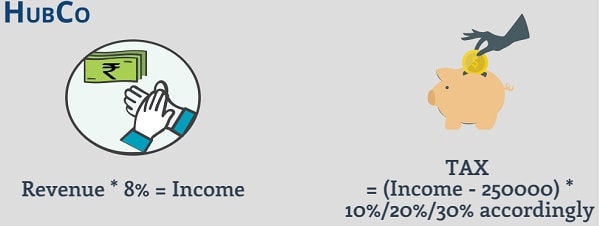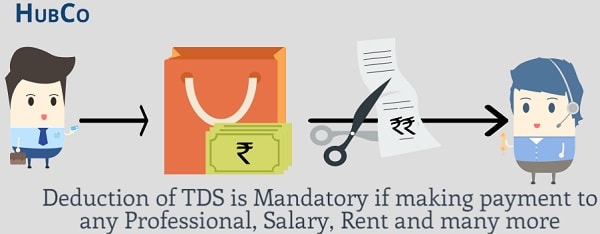Introduction
Getting into the day to day work, we never thought what we missed yesterday or what we can plan for tomorrow. We at Hubco.in, always receives queries from budding entrepreneurs and people serving under employment related to Tax planning and from there we get to know that these are the problem of masses.
Based on recently delivered verdicts and the queries received, we were able to create 4 tax hacks that could really be helpful if followed properly. –
1. Income @ 8% of the Revenue – Deemed income: Now, this is one of the sections that you will love to read. Mostly businesses or startups don’t know about the benefit of this section and ends up paying higher tax.

Let us understand this by way of an example. The below table is the annual report card of an Individual having business income. We will analyze the same figures under two different cases for FY 2015-16;
| NORMAL CASE – As mostly people do | SECTION 44AD – The unknown benefit |
| Revenue earned – Rs.60,00,000/- | Revenue earned – Rs.60,00,000/- |
| Expenses Incurred – Rs.48,00,000/- | Expenses Incurred – Rs.48,00,000/- |
| Profit before tax – Rs.12,00,000/- | Profit before tax – Rs.12,00,000/- |
| Taxable Income – Rs.12,00,000/- | Taxable Income – Rs.4,80,000/- (8% of Revenue – as per law) |
| Tax on above income Rs.1,90,550/- | Tax on above income Rs.21,630/- |
From the above table, you can see that the total tax saving is Rs.1,68,920/-. Further, as per section 44AD, you don’t have to keep any books of accounts for income tax purposes.
The features of this section is as follows:
- This section assumes your taxable income to 8% of the gross revenue.
- This section does not apply, if your gross turnover exceeds 1 crore.
- This section applies to business only, technical consultancy or profession is not covered under this section.
2. Forgot to Deduct TDS: This is one of the section, people tends to forget the most. TDS means tax deducted as source. As per the law, there are various payments prescribed on which tax is required to be deducted before making the payments.
As a startup, we tend to forget about this deduction and become an assessee in default.

Which payments require TDS deductions?
Through, there are various payments, which require TDS deduction, we are listing here some of the important deductions to be made:
| Section | Nature of Payments | AMOUNT LIMITED | TDS Rate |
| 192 | Salary | Monthly – If the employee is liable for Income tax | Total Income tax of employee divided by 12 = Monthly TDS to be deducted |
| 194 | Deemed dividend (Explained Above) | If amount exceeds INR 2,500 per annum | 10% |
| 194H | Commission or brokerage | If amount exceeds INR 15,000 per annum | 5% w.e.f 1St June, 2016. |
| 194I | Payment of Rent | If amount exceeds INR 180,000 per annum | 10% – If rent is for land, building or furniture.
2% – If the rent is for machinery, plant or equipment |
| 194J | Payment to professionals, technical consultant, Royalty etc | If amount exceeds INR 30,000 per annum | 10% |
| 195 | If making payment to any NR or NRI, and his income is chargeable to tax in India | No limit, We have to deduct for any payment | Tax rates differs from case to case. |
Consequences of non deduction
Non deduction of TDS will have the following consequences.
- The expense on which TDS is not deducted; it shall be disallowed while computing the total taxes.
- Interest or penalty for non deduction of tax shall be levied.
Any hack- if this is section also none complied?
Yes, like we always have. We have a solution to this problem as well. As per the current provision, if you don’t deduct the TDS on anyone income, then make sure that person has filed their return and paid the due taxes.
If this is done, then penalty and disallowance shall be waived off, only interest you have to bear.
3. No more tax heavens?: There are often instances in the past that people generally incorporate the companies in tax heaven and skip the tax base of their resident country.
In India, people generally incorporate the companies in Dubai, Mauritius, British Virgin Island etc. so that they will not be liable to tax in India instead, there income will be liable to be taxed in the tax heavens where tax rate is almost negligible.
Look, how they save tax through this route
| Owner Locating in? | Company registered in | Residential status as per law | Income earned | Tax on Income |
| Owner residing in India | India | Resident of India | 1 Cr | 30 Lakh |
| Owner residing in India | Mauritius | Resident of Mauritius | 1 Cr | 4 Lakh |
| TOTAL SAVING | 26 Lakh | |||
You can see in the above table, that in both the cases, owner was residing in India and can easily skip their taxes by registering companies in tax heavens. This is due to a lacuna in the present law.
In India, law can only tax the Indian companies. Further, foreign company will be treated as resident only if the control and management is wholly situated in India.
Lacuna plugged
The above tax planning was very famous, until Finance Act 2016. As per recent amendment the above planning is curbed to certain extent. As per recent amendment, foreign companies can be treated as Indian company if the place of effective management is in India.
The place of effective management means a place where mostly key management and commercial decisions that are necessary for the conduct of business of an entity are made.
Hence, after this amendment, the current situation is as under:
| Particulars | Company registered in | Residential status | Income earned | Tax on Income |
| Owners residing in India | India | Resident of India | 1 Cr | 30 Lakh |
| Owners residing in India | Mauritius | Resident of India | 1 Cr | 30 Lakh + 4 Lakh |
| TOTAL SAVING | (4 Lakh) | |||
Since the owners are residing in India, then we can assume that the pace of effective management is in India.
The company shall be liable to tax in both the countries. However, India will provide some credit of tax paid in foreign country.
Any Hack?
Yes, the lacuna is not still plugged fully. There is a hack to avoid the recent amendment of law. Under present structure of Income tax act, India has signed various Double Taxation Avoidance Agreements (DTAA) with more than 90 countries.
As per Indian law, if income of any person is taxed in two countries, then he can use the benefit of DTAA. Further, the same person has the option to choose the provision between DTAA and income tax act, whichever is more beneficial.
Likewise, DTAA still carries the older definition which was there under income tax act, 1961 before amendment. Hence, if the person uses the benefit of DTAA, then he will be treated as resident of Mauritius (as stated in the example) and his income shall not liable to tax in India.
4. The Harshness of Deemed dividend: Have you ever thought that loan or advance taken from the company can be treated as your income? Shocked? Please read the full section in detail below;
While running a company, we tend to withdraw money from the bank account of the company for any reason. Sometimes, we withdraw for business use or sometimes for personal use. At the time of filing, your accountant clubs this withdrawal under loans or advance from the company.
From the prima facie look, the above transaction looks so simple. However, we will show you the ugly face if it. Once, you have completed the transaction, you fall under a trap. As per law, your this loan or advance, will be treated as income in your hand. This will apply even if you have taken money for official purpose.
As per section 2(22)(e), any loan or advance from the company to the person, owning more than 20% of the share capital, then the sum shall be treated as deemed dividend in the hand of shareholder. Further, Company is required to deduct TDS @ 10% and deposit the same to the govt only makes it worst.
Let us see the figures:
| Particulars | Amount Withdrawn | TDS rate | Company’s Liability |
| Total Money withdrawn | 200,000 | 10% | 20000 +Interest +Penalty |
| Total Money withdrawn | 400,000 | 10% | 40,000 +Interest +Penalty |
| Total Money withdrawn | 800,000 | 10% | 80,000+Interest +Penalty |
| Total Money withdrawn | 1000,000 | 10% | 100,000+Interest +Penalty |
Any hack?

As always, there are ways to avoid the harshness of this section:
- Always take money as a salary from the company.
- If you are taking any advance from the company, then take it in imprest account and submit supporting to every amount spent.
Conclusion: This is not the end
We have explained the four tax planning to help you from the tax problems. This is not the end; we will come back with another chapter of amazing tax planning’s which will help you in your daily business and salaried life.
You can contact the author on agamgupta72@gmail.com
Disclaimer
This article or author does not promote in any case the illegitimate tax planning and the author is strictly against such practices. This article only explains action of government against the tax practices in the real world. Author will accept no liability if anybody gets harmed or aggrieved with the above article in any case.




